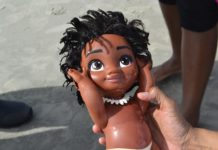Two years ago, my father’s choir at the University of Hawaii was invited to sing at a big international diversity concert at Lincoln Center in New York for Martin Luther King (MLK) Day. Choirs from around the world had been invited to sing together, and a Hawaiian choir adds instant diversity with its multicultural population of Chinese, Japanese, Korean, Filipino, Portuguese, Caucasians and native Hawaiians. That summer, over a breakfast of Chinese pancakes and Portuguese sausage, my father told us about the difficulties he had had the night before at choir practice pronouncing the words in the spirituals that they were learning, “You have to say the words like a Negro,” he said.
Twelve-year-old Hao Hao gently corrected him: “African-American. These days you should say African-American.” (I bet Senator Reid wishes his grandchildren had told him this, too.)
My father did not know, “Oh, ok. You have to pronounce the words like an African-American.” A seventy-year-old immigrant, he can barely get his mouth around the words.
My father continued to describe the scene at the previous night’s choir practice. Someone had asked, “Why are they wading in the water?” Not one person in this Hawaiian choir knew, not the professors or the mainlanders or even the choir director. They decided perhaps it is swampy in the South and there just is water everywhere.
Thirteen-year-old Mango explained, in shorthand, “To get away from the dogs.”
My father did not understand, “But dogs can swim.”
Mango continued, ever gently, “No, so the dogs can’t follow their scent.”
“Why don’t they want their dogs to go with them?”
“Not their dogs. They’re running away from slavery. The slaveowners’ dogs.”
“Oh!” a light went on in my father’s head, “Slavery!”
I was so impressed to watch my children gently, ever gently, patiently, without judgment or consternation, lean over the kitchen table with soft #2B pencils pouring over the music scores with my father. The girls explained to him that in spirituals, a lot of the songs are coded instructions on how to escape to freedom, for example, in “Follow the Drinking Gourd,” the drinking gourd refers to the Big Dipper and the North Star; in other songs, the River Jordan represents the Ohio River, the last river to cross before reaching freedom in Canada; and Canaan means Canada because once slaves made it to Canada, they could not be sent back, as they could from the northern states.
“One more question,” my father asked, “Why does it keep talking about ‘the children’? They took their children with them?”
“That’s the children of Israel. They are using the story of Exodus as code to talk about their own escape into freedom.”
I am moved to realize that what never occurred to an entire Hawaiian choir, with such a different population and history, is so straightforward and matter of fact for my children who have grown up an hour outside of Detroit, attended Dr. Martin Luther King Jr. Elementary, who have friends of many different races, ethnicities, cultures, religions, and languages, and who have been taught this history in school and at various MLK Day/Black History Month/Diversity Day programs.
I told this story last year to the Rev. Robert B. Jones at the University of Michigan MLK Day Youth Program where we were both speakers, and it reminded us both how important it is to learn about other people’s cultures—to taste their food and sing their songs and dance their dances—but to also back up that cultural taste test with a solid grounding in history and politics so that we fully appreciate its meaning and significance.
This article was originally published at annarbor.com. This article is adapted from a chapter in Frances Kai-Hwa Wang’s upcoming book.



































This is a great article. I’m very happy to see that the children were so aware and able to explain!!
Fantastic story, Frances! And your last line really hit the nail on the head — It’s important to “back up that cultural taste test with a solid grounding in history and politics so that we fully appreciate its meaning and significance.” The “why” of cultural traditions is, in man ways, so much more important than the “what”.